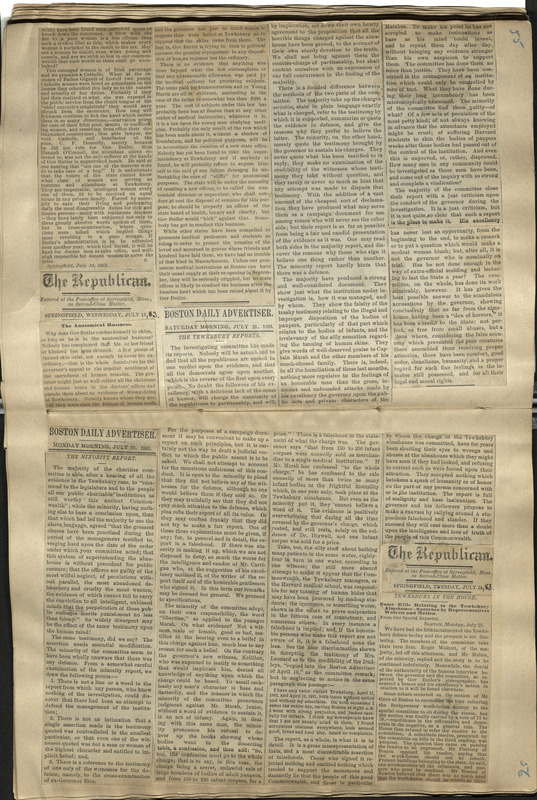Tewksbury Investigation
A state almshouse for paupers at Tewksbury was founded in 1852. In the 1880s, charges of theft and abuse of the inmates–including the sale of bodies of the deceased to Harvard and other medical schools for anatomical dissection–were leveled against the caretakers. Governor Butler, in his testimony before the Investigation Committee, stated, "The defence brought three or four of these people here to swear that nobody ever dissected a body there, and nobody ever desired to so do. That is entirely contradicted now by the testimony of four or five witnesses. They said also that there never was but one body at a time in that dead-house. They swore that–two at the most. I had two men here yesterday–entirely outside men–who said they saw dead bodies, ten on the tables, and in the dead-room twelve to twenty more piled up like cordwood, higgledy-piggledy, the dead infants between the adults' legs."
Butler's accusations and a considerable public outcry derived, in part, from the testimony of Dr. John Dixwell (1848-1931), an 1873 graduate of the Medical School. According to an article printed in the Lowell weekly sun for March 31, 1883, Dixwell testified before the Committee on Public Charitable Institutions that, "During the three years he saw and knew of several hundred bodies of infants, each year, being brought to the school for dissection. They were brought there in trunks, in a country team, and were deposited in a little anteroom on crates or shelves until the students were ready to use them. The students obtained the bodies by applying to ‘Bill' Andrews, now dead, who fixed the price at from $3 to $5 each, for infants, or for part of an adult, according to the supply…. The bodies of infants were sought for by persons who wished to practice dissection, because they could easily be taken in a bundle and carried home. Personally he had two or three every week during the season. Some of those dissected showed that they had died from starvation. The witness said that Andrews told him the bodies came from the Tewksbury almshouse." The legislative investigating committee ultimately pronounced Butler's charges unsustained and false.


